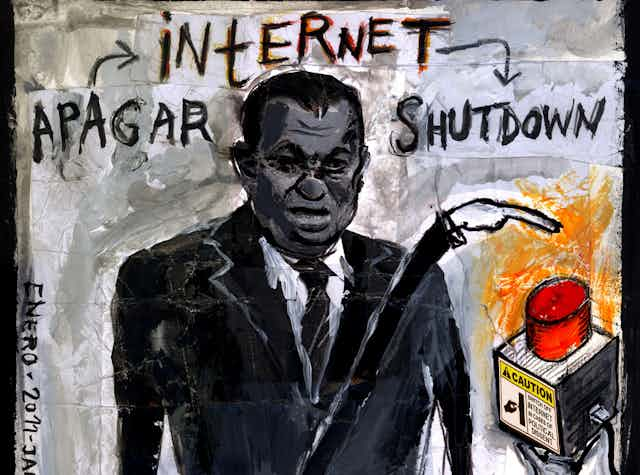Syrian residents found themselves without the internet for some 19 hours on May 7 and 8, in what many see as a long-term government campaign to use the internet as method of state control.
According to BBC reports, local residents of Syria were told there was a “fault in optical fibre cables” but this is unlikely as submarine cable maps show three active cables connecting Syria to the outside world.
Other reports have the government blaming terrorists but there is evidence that would suggest this is also wrong.
The backbone of the internet is a network of Border Gateway Protocol (BGP) routers. BGP is the set of regulations affecting how internet routers route your email and web requests across the internet. Without it, there’s no internet.
The Syrian owned BGP routers were steadily closed down over a period of 2 minutes, typical of a fast, manually controlled close down, in order to isolate the country.
Belgian network expert Frederic Jacobs caught this change in the network and produced an excellent visualisation of the event on YouTube, which you can view below.
So who was behind the shutdown?
Such control is only possible from the state-controlled network centres in Damascus.
There have been several other breaks in the Syrian internet connection in recent times, coinciding with breaks in fixed and mobile phone operation.
These are reported as being precursors to military action where the government is trying to disadvantage the opposition fighters. Another suspected reason is to forestall attempts at protest or any other anti-government activity.
It is unclear from the current muddled reports if the recent outage was related to activities which the government was trying to mask or prevent.

Syria has been marked by Reporters Without Borders as an “Enemy of the Internet” since 2006.
In 2009 the Committee to Protect Journalists rated Syria the third worst country in the world in which to be a blogger, and anti-government bloggers and journalists have experienced wide-scale arrests and torture.
How can I talk to friends and family in Syria?
If you are conversing with anyone in Syria please remember that you are almost certainly being monitored by the government, and there can be dire consequences for local Syrians if the government disapproves of what is said.

Contacts through known open proxy servers which hide your identity are enough to arouse suspicion.
Sending what is clearly an encrypted file, even if the government cannot read it, may be sufficient grounds for undesirable government attention for the recipients.
Encrypted speech and video may be less likely to arouse suspicion as most internet phone and video phone applications use encryption as standard, but even here there are dangers.
The US-based digital rights organisation the Electronic Frontier Foundation reports that the Syrian government is deploying a Trojan horse for Skype in order to spy on its citizens.
The government can easily work out who is being called even if it cannot listen to you. If you are working in the US consulate in Sydney, it would be a really bad idea to talk to your friends in Syria!

An ongoing cyberwar
The EFF also reports a concerted effort by the Syrian government to infiltrate the computers of activists.
There is even one case of an anti-spy website which warns people about the dangers, but has documents and other features which can infiltrate a victim computer and report to Syrian intelligence.

Most of these tools appear to be aimed at Microsoft Windows based computers and so a Linux-based computer, particularly a live-DVD based system which cannot be corrupted, may be a lot more secure.
If a Windows computer is being used it is vital to ensure it has the latest security updates as there are many well known vulnerabilities that only recent security updates will fix.
The Syrian government is also on the receiving end of cyberattacks. The hacking group Anonymous managed to liberate 1GB of documents from the Syrian Ministry of Foreign Affairs in December 2012.
According to hackmageddon.com, Anonymous is in active engagement with the Syrian Electronic Army (SEA), a cyberwarfare unit that claims to be independent, though it clearly operates with the blessing of the Assad government.
Anonymous has managed to deface many Syrian government websites.

But the SEA has also made many exploits: hacking the BBC, and many sites in the US and Qatar who both support the rebels.
Twitter, who was attacked by the SEA, has retaliated by banning any account set up by SEA.
The Assad government and the SEA most likely feel they have nothing left to lose and it will be interesting to see what they can achieve with a full blown cyberattack against their enemies.
Syrian government censorship and misinformation has made it very difficult to know what is really happening in Syria.
This in turn makes the world’s big players such as the US, and local players such as Turkey and Israel, very uneasy.
There may be a strong pressure to act based on rumours of serious issues, such use of chemical weapons.
In strangling the internet and the media, the Syrian government may be its own worst enemy.

